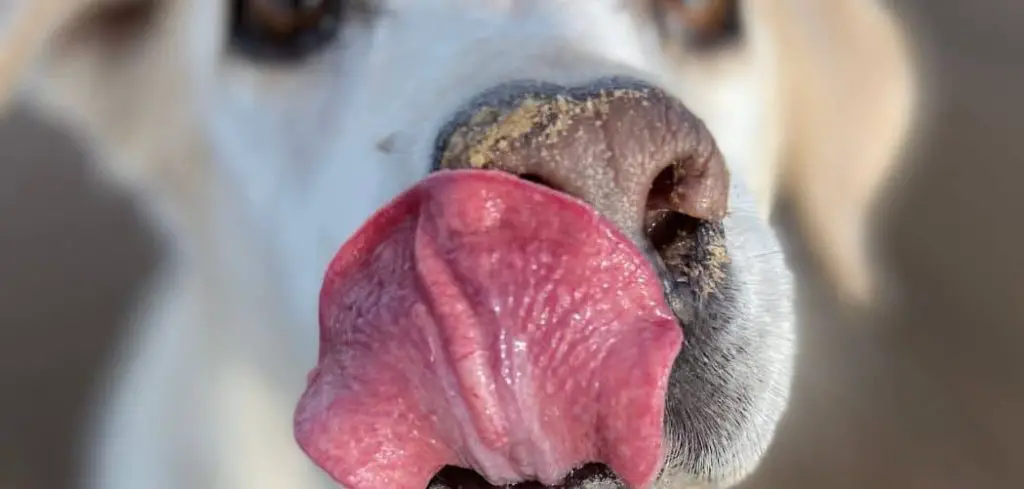Dogs communicate through subtle body language, and one of the more concerning signs pet owners notice is constant lip licking.
While it can sometimes be harmless, frequent lip licking can also point to underlying health or behavioral problems that should not be ignored.
We outline the common reasons for a dog constantly licking its lips, what you can do at home, and when to seek veterinary help.
Dog Constantly Licking Lips — Why It Happens
A dog constantly licking its lips may be experiencing nausea, dental discomfort or more serious issues such as anxiety, dehydration, or even poisoning. Dogs also lick their lips when they feel stressed, when something is stuck in their mouth, or when they are anticipating food.
In some cases, medical conditions such as seizures, liver disease, or oral injuries can cause excessive lip licking. Since the range of possibilities is broad, paying attention to other symptoms and context is key.

Dog Constantly Licking Lips: Common Causes
Nausea and Gastrointestinal Upset
When a dog feels nauseous, excessive lip licking is one of the first outward signs. The behavior often comes with drooling, pacing, or attempts to eat grass.
Nausea may stem from something minor like dietary indiscretion or more concerning issues like pancreatitis or toxin ingestion.
Because nausea makes dogs uncomfortable, they instinctively lick their lips to cope, making it an important symptom to monitor.
Read more: Dog Constantly Licking Paws (What it could mean)
Dental Pain or Oral Injury
Problems in the mouth, such as broken teeth, gum infections, or mouth ulcers, can trigger frequent lip licking.
The discomfort prompts a dog to lick repeatedly, almost as if they’re trying to soothe the irritation. Bad breath, difficulty chewing, or pawing at the mouth may also be present.
Ignoring dental issues can lead to severe infections or tooth loss, so oral health should never be overlooked.
Stress and Anxiety
Dogs under stress often display repetitive behaviors, and lip licking is one of the most common. Loud noises, unfamiliar environments, or separation anxiety can all trigger this response.
Unlike medical causes, anxiety-related licking often occurs alongside other signs, such as pacing, whining, or hiding.
Chronic stress impacts both emotional and physical health, so addressing anxiety early is important.
Dehydration or Heat Stress
If a dog is overheated or dehydrated, constant lip licking may occur because of a dry mouth and increased thirst.
This often pairs with panting, seeking shade, or general lethargy. Heat stress is dangerous and can quickly escalate to heatstroke, which is life-threatening.
In these cases, lip licking serves as a warning that the body is struggling to maintain balance.
Seizure Disorders or Neurological Conditions
In some cases, neurological disorders like partial seizures can cause abnormal repetitive behaviors such as lip licking.
During or after a seizure episode, dogs may lick their lips excessively without clear triggers. This behavior can also appear alongside disorientation, tremors, or uncoordinated movements.
Neurological causes are serious and always require veterinary assessment.
Poisoning or Toxin Exposure
Certain toxins, including household chemicals, poisonous plants, or even some foods, can cause drooling and constant lip licking.
Dogs may try to lick their lips repeatedly if they’ve ingested something irritating or toxic. Additional signs may include vomiting, tremors, or collapse.
Because poisoning progresses quickly, immediate veterinary attention is crucial if this cause is suspected.
What to Do If Your Dog Is Constantly Licking Its Lips
If a dog is frequently licking its lips, observe the context. If it happens around mealtimes, anticipation of food could explain it. However, if the behavior appears suddenly, occurs frequently, or comes with other symptoms, take it seriously.
At home, make sure your dog has access to clean water at all times to rule out dehydration.
Check their mouth for obvious issues like a foreign object or swelling. Keep stress triggers to a minimum by providing a calm, safe environment.
If you suspect mild nausea, withholding food for a few hours and then offering a bland diet may help, but persistent signs require professional care. Above all, trust your instincts—dogs don’t show discomfort without reason.
When to Call or Visit Your Vet
Seek veterinary care immediately if your dog’s lip licking is accompanied by vomiting, diarrhea, drooling, seizures, or collapse. These signs may point to poisoning, heatstroke, or other emergencies.
Persistent lip licking that doesn’t improve, especially if paired with bad breath, bleeding gums, or difficulty eating, suggests a dental problem requiring treatment.
Likewise, if anxiety seems to be driving the behavior and it affects your dog’s daily life, a vet can recommend behavior strategies or medications to help.
Always call your veterinarian if the cause is unclear. Even if the issue turns out to be minor, ruling out serious problems provides peace of mind and ensures your dog’s safety.
Read more: Dog Licking Lips and Not Eating (Here’s what you should know)
Key Takeaway
Constant lip licking in dogs can be a harmless anticipation of food, but it can also signal discomfort, stress, or illness. Because the causes range from mild to life-threatening, it’s important to observe your dog closely and act quickly if concerning symptoms appear.
Keeping your pet hydrated, calm, and monitored at home is helpful, but veterinary guidance is often the best way to ensure nothing serious is missed.
By paying attention to this small behavior, you can protect your dog’s health and well-being.
